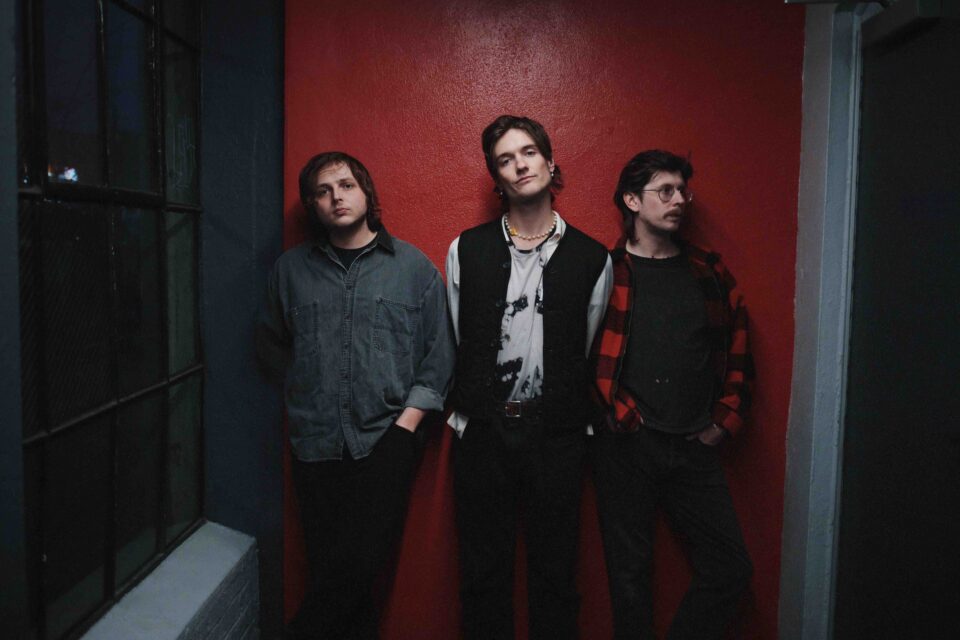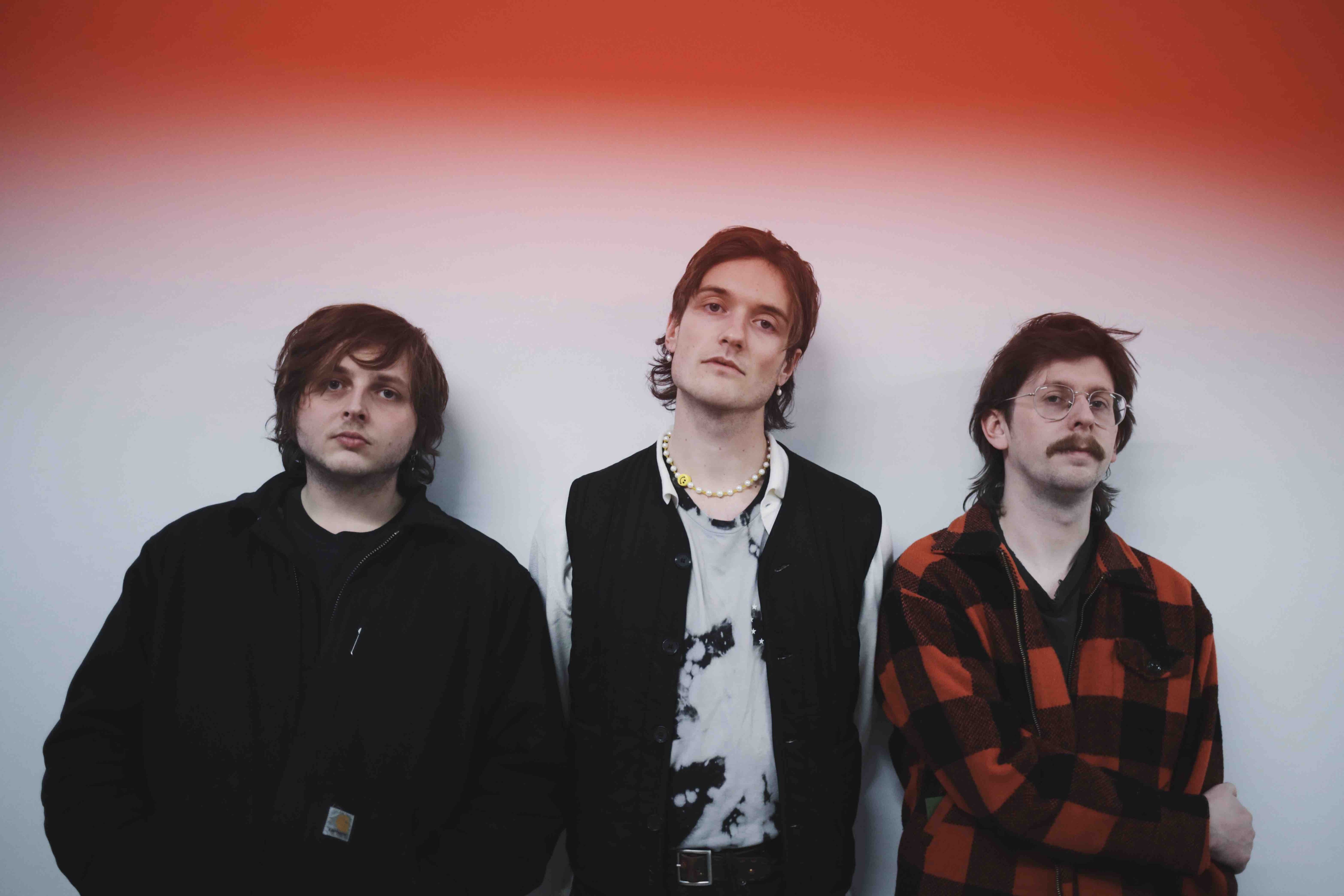Drawing from a variety of film noir and old-school horror movies binged during 2020, Vundabar’s new album Devil for the Fire is peppered with disorienting and apocalyptic images. “And the days get eaten up / On a hurricane of blood,” Brandon Hagen sings on “Ringing Bell” as guitar pings spark around him like free-floating embers, his voice hovering in a sweet falsetto somewhere between longing and foreshadowing. But Devil for the Fire is an exercise in reframing one’s mentality rather than a pessimistic take on objective reality.
Heatwaves, vampires, looming darkness, and demons rage through the album’s bumpy, chaotic tracks. But Hagen, Drew McDonald, and Zachery Abramo have mastered a playful, punky tone that sets them apart as a go-to listen for thought-provoking melodic rock music. Despite the noir influence and dark imagery, the majority of these tracks are as thrilling as a ride at an amusement park. One of the album’s highlights, “Nosferatu,” pairs springy drums with winding guitars as Hagen’s vocal gymnastics embody a bouncy ball launched sky high.
It’s significant that the most somber song doesn’t involve mythological horrors or Hollywood thrills. Opener “Aphasia” was named for a disorder where one’s comprehension and expression of language is impaired. It’s what Hagan’s dad was diagnosed with after suffering a stroke while Vundabar was making the album. Hagen explains he found hope while reading about neuroplasticity and the brain’s ability to remap itself to reshape one’s reality. Chatting with Hagen over Zoom, he hopes that listeners grab onto the project’s hopefulness. “I hope it’s cathartic,” he says. “I hope it feels a little like a ride, a little twisty-turny,” he adds, smiling.
What’s your relationship to this set of songs now, since they were recorded in 2020?
This record is so specific to a moment for me. It's not even necessarily the amount of time passed; when we were making the record, all of these different things were happening that sort of made it what it is. If we recorded it at any other time, it wouldn’t be the record that it is. But I’m not sick of it. I honestly feel I’d be more sick of it if it came out sooner, because I’d be spending more time with it. We recorded it and got to give it a rest.
It’s interesting because you’ve recently had the viral moment with “Alien Blues” and seeing that song have a whole new life after several years via TikTok.
No one knew about that record [2015’s GAWK] when it came out. Some people found out about it and passed it around. Up until the TikTok thing, I was still seeing new kids find that record and forming a connection with it. And then this was sort of the latest iteration. TikTok made the sharing more explosive. It kind of makes sense to me, too, because I was like 19 when we recorded it. It doesn’t surprise me that a lot of young people around that age are identifying with it.
“I like horror because characters or monsters are created that are reflections of people’s darkness. They’re walking allegories.”
How did it feel to revisit it with the new version with Indigo De Souza?
Prior to that, on this new record, we did some alternate versions of songs. It's kind of nice to separate in your mind, like, “OK, we have chord changes, lyrics, and a melody, and then a musical interpretation of that.” Realizing you can take those parts and go anywhere with it has been really nice. It’s a fun challenge. I learned more about my songwriting, having to revisit something I wrote.
When we put out that record in 2015, I was like, “I think this is a fucking great record.” [Laughs.] So it’s nice that people are like “I concur.” Before any of this happened, we were very happy with how things were going. I don’t think there’s any part of us that were like “woe is me” with not getting our due. With that album, it was finding its people over the last five or six years. Putting out records and realizing they can grow over years is comforting.

Processed with VSCO with c8 preset
What other songs did you have alternate versions for?
We did an alternate of “The Gloam” that Indigo helped us out on as well. We did an alternate of “Aphasia” and “Listless Blue.”
What about a song makes you want to revisit it in a new way?
Well, “The Gloam,” for example, I just heard it as a really fast, punky, downstroke kind of song and then, I don't know—it's a melodic thing. If you slow it down or strip it back, the melody shines in a new way. If it feels like there’s another way of exploring, then it’s worth exploring.
Speaking of “The Gloam,” that’s a song that kept sticking with me. Across the album there’s lots of atmospheric, dark, folky lyric imagery.
Horror was a big influence on the album. Using different symbols to create a little world. Something that’s referencing reality, but not quite reality. Which felt like the time we were writing in. I think for everybody, reality got a little blurred.
“I think that’s why music or art is relatable—a record is identifying themes and patterns of your life. Those motifs are in anybody’s life. I guess it puts structure into something that would otherwise be a series of disparate events devoid of meaning.”
I feel like it’s still pretty blurred.
Absolutely, every day is a truly psychedelic experience, drug-free [laughs]. I don't even think it was conscious—a lot of that stuff I noticed after the fact. But if you’re writing it all at the same time, there’s going to be throughlines. I realized this pliable reality, this augmented close-but-not-quite reality. I like horror because characters or monsters are created that are reflections of people’s darkness. They’re walking allegories.
Is that how albums usually take place for you—that you’re constantly trying to piece them together after the fact?
I’m always writing, but the throughlines are there because I’ll go through and align with whatever the time period is. The throughline will be whatever I’m thinking about or what I’m taking in. While I was writing this album I was watching a ton of horror and reading a bunch of books on neuroplasticity and neurology and film noir. Then my dad had a stroke and I put those things together and found that there was a lot of overlap. I think that’s why music or art is relatable—a record is identifying themes and patterns of your life. Those motifs are in anybody’s life. I guess it puts structure into something that would otherwise be a series of disparate events devoid of meaning.
That’s interesting that you’re reading about neuroplasticity. Did you learn new things about how your own brain works?
Absolutely. This record being a house of mirrors, constantly warping reality. That’s tying into neurology in the sense that basically these books are saying your sense of being, your sense of reality, your experience of life, a lot of these things are habits of the mind. It was this realization that the mind is pliable, therefore reality is pliable, therefore you can change your reality. Which, for me, that’s the hopefulness of the record.
So I’m thinking of these things from these books, and then my dad has a stroke and gets aphasia. All of that research that’s done on neuroplasticity is done on stroke patients because they’re people that have partial brain death, and then they have to remap their brain through habit and repetition. So I’m reading about these things and then seeing them happen in real time as we’re finishing this record and recording it. I’m seeing this person recreate their reality, basically. But I found that to be very hopeful, especially in a time where it feels like there’s such lack of control. You can literally change how to experience the world.
“I feel like that's also been a Vundabar throughline of equally tempering humor with some darker elements and a sense of play. I do think there’s a playfulness to the record, even if some of it is a bit gloomy.”
This album starts with “Aphasia,” the most serious-sounding track, and then it becomes more upbeat and hectic.
It's strange times, and people our age are feeling conflicted [about wanting] to enjoy life no matter how uncertain it feels. But also there are these things at play that are pretty terrifying. That push and pull of wanting to get your kicks while you can and then actively engaging in the terror [laughs]. I feel like that's also been a Vundabar throughline of equally tempering humor with some darker elements and a sense of play. I do think there’s a playfulness to the record, even if some of it is a bit gloomy.
Another aspect of the album is not being able to see the entire picture. With the title Devil for the Fire I thought of the saying “forest for the trees.”
Yeah, that’s exactly it. That’s sort of where this surreal, house-of-mirrors thing comes in—a loss of reference point. Then once that reference point is gone, things are a lot more about impression. Is that a tiny house, or is that house far away? FL







